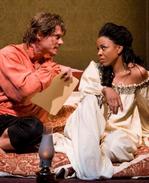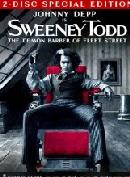HOME PAGE
SITE GUIDE
SEARCH
ADVERTISING AT CURTAINUP
REVIEWS
FEATURES
NEWS
Etcetera and
Short Term Listings
LISTINGS
Broadway
Off-Broadway
NYC Restaurants
BOOKS and CDs
OTHER PLACES
Berkshires
London
California
New Jersey
Philadelphia
Elsewhere
QUOTES
TKTS
PLAYWRIGHTS' ALBUMS
LETTERS TO EDITOR
FILM
LINKS
MISCELLANEOUS
Free Updates
Masthead
Writing for Us
A CurtainUp Los Angeles Review
The School of Night
| There are two realms we can live in. . .one of power, the other of poetry. You can't live in both! The poets must always stand against the powerful. . .otherwise truth would die! I ask you to be the poet that you are and dare to be the philosopher that you can be.— Christopher Marlowe to Sir Walter Raleigh
|

Gregory Wooddell as Christopher Marlowe and Tymberlee Chanel as Rosalinda
(Photo: Craig Schwartz) |
In 1592-93 Christopher "Kit" Marlowe (Gregory Wooddell) is in danger for his suspected atheism. He's also pressured by Sir Walter Raleigh, among others, to admit he kept a list of the names of those who participated in the School of Night, which freely explored scientific and philosophical questions which were considered heretical and treasonous by the Crown.
While at Scadbury, Kent, home of Sir Thomas Walsingham (Adrian LaTourelle) and his wife Audry (Alicia Roper), Marlowe presents his new play Dido and Aeneas starring his black Venetian leading lady, Rosalinda Benotti (Tymberlee Chanel), and an unknown actor they have recruited called Tom Stone (John Sloan), who is unveiled as the playwright William Shakespeare. Another visiting playwright, Thomas Kyd (Michael Bakkensen), author of The Spanish Tragedy, dashes out petulantly. Dashing petulantly in is Sir Walter Raleigh (Henri Lubatti), scrabbling desperately to get back in the Queen's good graces. Saying little but hulking ominously through the play like a dark thread is Ingram Frizer (Ian Bedford), who ultimately claims to have killed Marlowe in self-defense.
Director Bill Alexander, who has helmed many of Whelan's plays, brings this one to devastatingly exciting life and reins in his fine cast with a sure hand. Alexander stages a marvelous commedia del arte pantomine at the beginning of Act II which underscores Rosalinda's character as the daughter of a Commedia del Arte actor and explains her insistence that those actors don't need playwrights.
From the first monologue, in which Marlowe switches God to Dog searching for a way to engage in a spiritual life with someone, you know you're in good hands— from the writer, the director and Gregory Wooddell who plays Kit. Wooddell makes Marlowe, a problematic historical figure and a dazzling writer, endearing, if maddening. A gay man whose only loyal partisan is the beautiful and talented Rosalinda, Marlowe could be his own worst enemy. Woodell finds the nuances, fears and overweening talent in Marlowe.
Whelan writes Shakespeare as an amazing vacuum cleaner of an artist, somebody who hears Marlowe throw out one thing and takes it to the next dimension. Marlowe realizes this and, in this play, there's no suggestion that Marlowe wrote Shakespeare's plays and transmitted them from Venice. Because Shakespeare didn't have the University education of the Earl of Oxford or Christopher Marlowe, these theories have been tossed around for centuries. Perhaps because Peter Whelan didn't have a university education and yet writes a stingingly literate play, he finds it easier to support Will in his own right.
Robert Perdziola designed the astute and opulent costumes, to which I take only one exception. Sir Walter Raleigh, a brilliant witty adventurer historically famous for his splendid attire, is dressed to t look like a jester on a bad day. My instinct is Sir Walter would have hated it and it damaged the stature and glamour of the character. Simon Higlett's set is inventive and atmospheric and Russell H. Champa's lighting design makea film noir cells of the window patterns on these Elizabethan floors.
The second new play of the New Taper's season and its first import. It's a play with something to say and impeccably done. Mark H. Dodd (Robyn Poley)
|
The School of Night Playwright: Peter Whelan Director: Bill Alexander Cast: Gregory Wooddell (Kit Marlowe), Michael Bakkensen (Thomas Kyd), Ian Bedford (Ingram Frizer), Tymberlee Chanel (Rosalinda Benotti), Paula Christensen (Landlady, Ensemble), Mark H. Dold (Robyn Poley), Johnny Giacolone (Mostyn, Officer, Ensemble), Michael Kirby (Prison Jailer, Ensemble), Adrian LaTourelle (Thomas Walsingham), Henri Lubatti (Sir Walter Raleigh), Jon Monastero (Harlequin, Ensemble), Rob Nagle (Nicholas Skeres), Richard Robichaux (Steward, Ensemble), Alicia Roper (Andry Walsingham), John Sloan (Tom Stone), Nick Toren (Pantalone, Ensemble). Set Design: Simon Higlettt Lighting Design: Russell H. Champa Costume Design: Robert Perdziola Sound Design: Cricket S. Myers Music: Ilona Sekacz Musical Direction: David O Fight Direction: Steve Rankin Commedia and Movement Direction: David Bridel Dialect Coach: Joel Goldes Production Stage Manager: David S. Franklin Running Time: Two and a half hours, one intermission Running Dates: November 9-December 17, 2008. Where: New Mark Taper Forum, 135 N. Grand Avenue, Los Angeles. Reservations: (213) 628-2772. Reviewed by Laura Hitchcock on November 9. 2008. |
|







